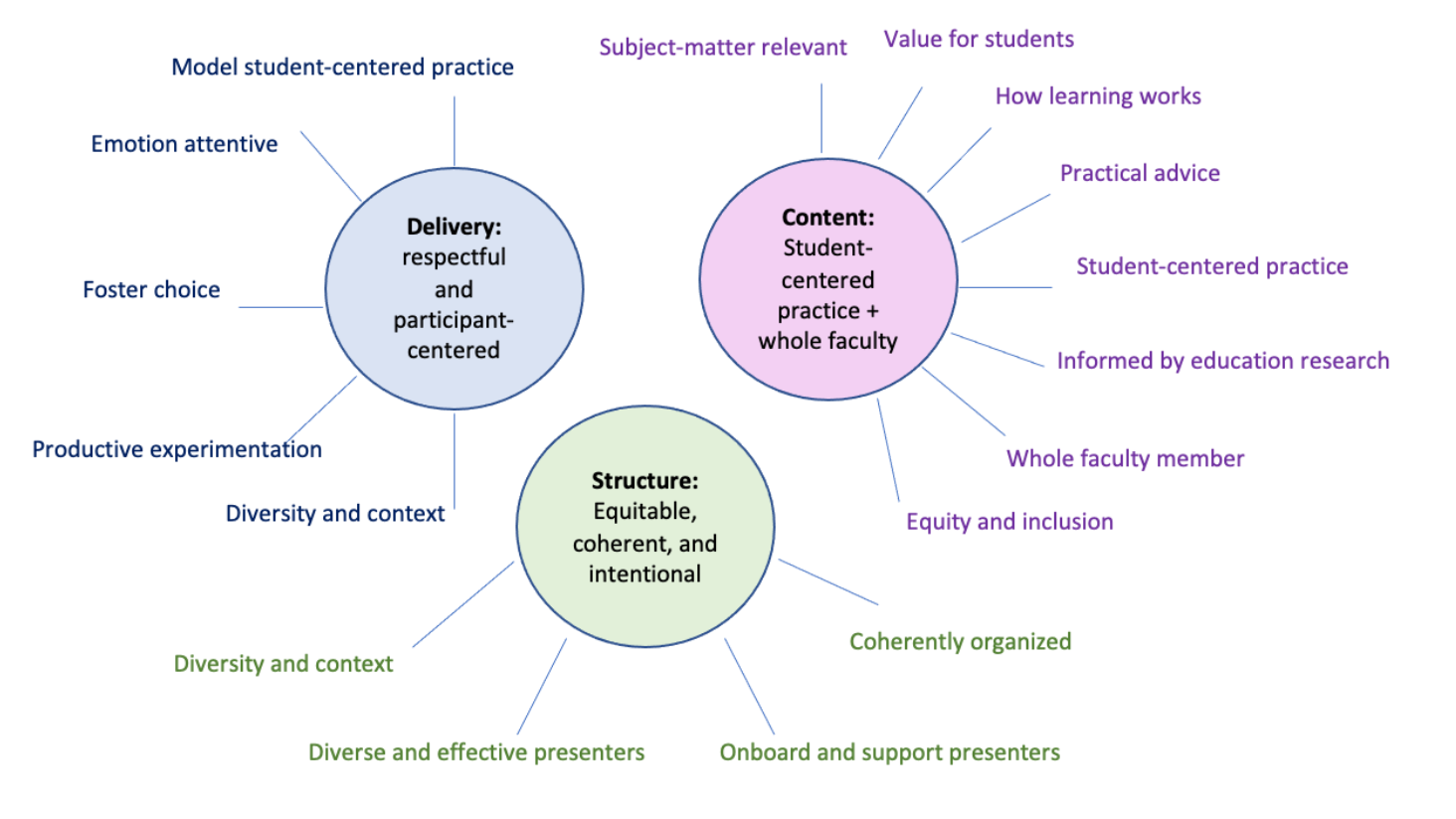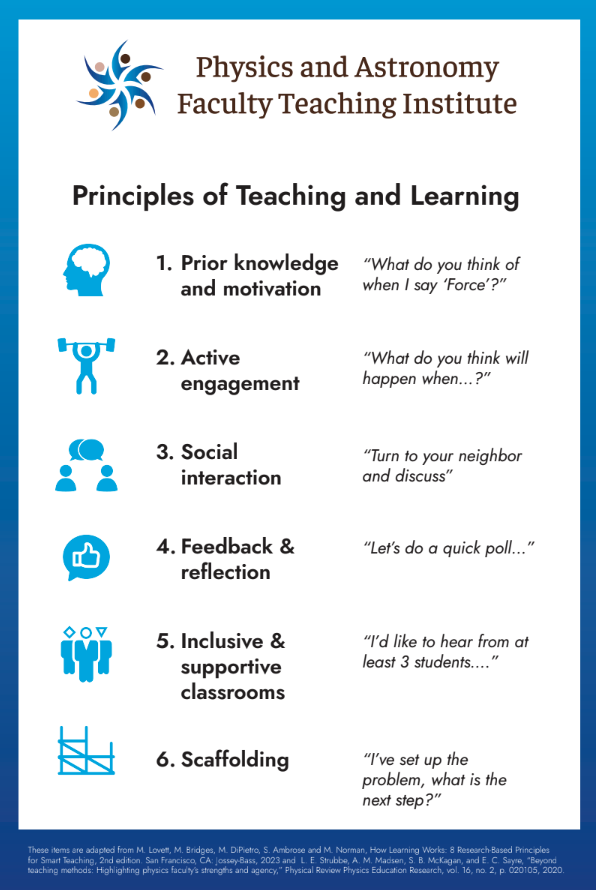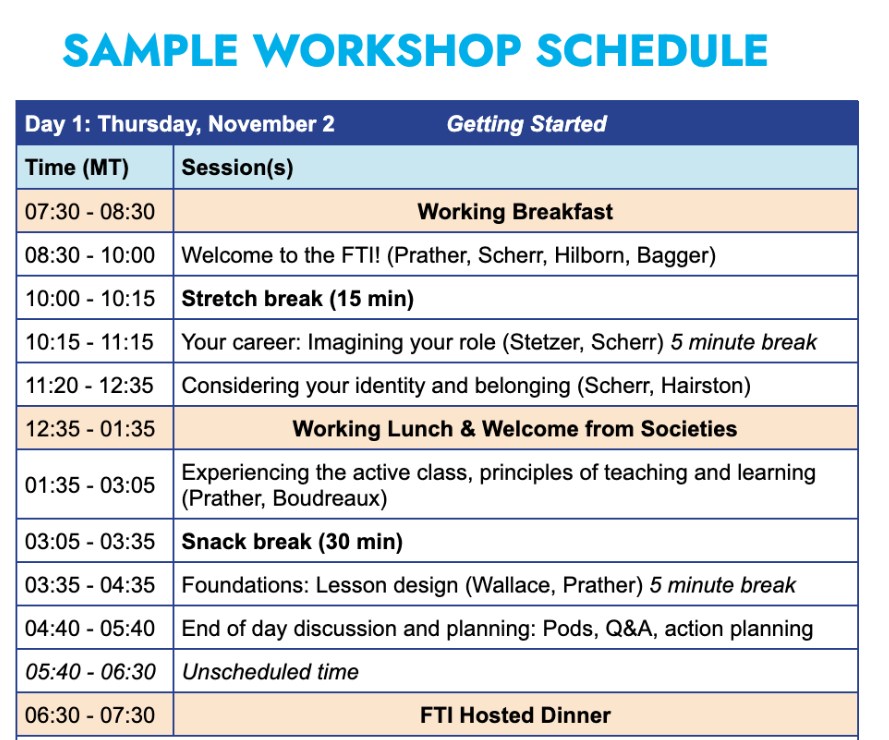A set of design principles has guided the workshop content, delivery, and structure.
The FTI provides a coherent workshop experience that builds across 4 days, weaving together how teaching and learning works, participant identity, and the different advantages of a wide range of teaching tools. These design principles are described in more detail below.

- We are committed to fostering equity and inclusion for all. There is explicit attention to equity and inclusion (writ large) in the classroom for all students, and in departments for all faculty.
- We provide subject-matter-relevant workshop content. Participants will have an opportunity to learn and practice student-centered activities that are directly tied to what they teach. In order to provide a workshop that is enticing to participants, and is more likely to lead to transfer to practice, the content of the workshop is grounded in the content, pedagogical content knowledge, curriculum, assessments, and classroom structures of physics and astronomy, informed by discipline-based education research.
- We emphasize the value of student-centered instruction for students. The content focuses on the value of student-centered practice for the students in participants’ classrooms, as this has been shown to be motivating for teachers in trying and sustaining such practice. Participants will also be shown how to gauge students for indications of teaching effectiveness so they get feedback on this practice.
- We use principles of “How learning works” as the explanatory framework. In order to provide a broad foundation in teaching and learning which may be adapted to a wide variety of teaching situations, the workshop orients participants to general ideas of how learning works, such as the importance of active engagement, practice and feedback, and social learning, etc. (Ambrose et al). Specific teaching methods are framed as examples of what can be done in the classroom to address these generalized principles of how people learn.
- We lead with practical advice. Content focuses on ideas that people can use immediately, grounded in classroom reality, and emphasizing ways to save time as possible. The workshop does not hesitate to give advice or recommendations for practice grounded in wisdom of practice, though with appropriate caveats (see “choice” below).
- We emphasize student-centered classroom practices, using a “big tent” philosophy. We are inclusive in our definition of what includes student-centered practice as including any practice in which students are intellectually engaged in the material, take an active role in developing and monitoring their own learning, engage in discourse, and receive effective feedback on their understanding.
- We are informed by education research but it is rarely a focal topic. Education research and theory is “baked in” -- that is, it is rarely an explicit topic, but does form the foundation of workshop content. Research is mentioned as necessary in support of why a teaching technique might be effective (“technique focused” not “research focused”.) Research results are framed using natural language as much as possible.
- We address the whole faculty member. We include sessions aimed at helping faculty develop skills to manage their new role (e.g., time management, mentoring, tenure and promotion). This also includes developing a broader perspective of how their department is situated within the institution, and how their department (and institution) is similar to and different from others, to help them navigate a variety of decisions in their home department.
- We are sensitive to diversity and context. The workshop presenters and sessions are attentive to issues of equity and inclusion (writ large) for the diverse participants in the room -- this includes institution type, departmental culture around teaching, appointment type, and characteristics of participants such as gender and ethnicity and sexual orientation. In practice this means providing breakout sessions and discussions to target different needs, and using inclusive teaching practices (e.g. equitable conversation structures) within the workshop.
- We model student-centered practice. Participants experience a workshop that models and is delivered using student-centered practices and is aligned with principles of how learning works. In practice, this often means using peer discussion, giving opportunities to reflect on one’s own teaching, giving participants a chance to reflect on why a technique might be effective, and circling back to key ideas. Participants are not viewed as passive receivers of information.
- We do not ignore feelings; rather we are emotion-attentive. There is explicit attention to creating an atmosphere that is centered on respecting and supporting one another; we celebrate the joy that can come from collaboration and from teaching well, value the wisdom in the room, recognize that there may be fear of judgment or failure, and acknowledge the stress which comes from being a new faculty member with multiple demands.
- We explicitly foster choice and agency. Teaching techniques are not presented as static recipes to be adopted. Rather, participants are encouraged to thoughtfully select among a wide array of teaching practices that support student learning and adapt them to suit their specific pedagogical needs and local context.
- We encourage productive experimentation. Becoming an effective teacher is an iterative learning process, and the goal is not perfection but rather to engage in “productive experimentation” which is a hallmark of scholarly teaching practice. Thus, we frame teaching improvement as a long-term process of trying things, reflecting on student experiences, successes and challenges, and making continuous improvements -- fostering a growth mindset.
- We are sensitive to diversity and context. The workshop presenters and structure are attentive to issues of equity and inclusion (writ large) for the diverse participants in the room -- this includes institution type, departmental culture, appointment type, and characteristics of participants such as gender and ethnicity and sexual orientation bringing in diverse presenters (see #2 below), and using inclusive structures (e.g. rooms for nursing mothers, gender neutral bathrooms).
- We intentionally assemble a team of effective and diverse presenters. The workshop organizers ensure that presenters are chosen for their diverse perspectives and characteristics, so that they complement one another, possess the necessary expertise and experiences to uphold the workshop principles, and provide relatable role models for a variety of participants. The desired attributes of our presenter team include: Disciplinary knowledge, teaching ability, collaborative personality, self-awareness, mentoring skills, people skills, experience designing and executing effective online teaching, and broad expertise in teaching and learning (rather than developers of a particular method). Presenters should also represent a range of characteristics (age, career stage, backgrounds, ethnicity, gender, institution type, practitioner/researcher, etc.)
- We onboard and support presenters as effective and reflective practitioners. All presenters will be well-versed in the design principles, expectations for session design, and information on inclusive teaching. Our team of presenters will take part in collaborative and respectful discussions -- before the workshop to prepare and align content and sessions, and during and after workshops to support reflective practice. We will provide specific one-on-one coaching, encourage co-facilitation (especially for new presenters), and provide adequate rewards for their time.
- We intentionally and coherently organize the structure and content around the workshop design principles. The workshop is organized by the design team, who make strategic decisions about the workshop, and evaluate whether the workshop as a whole is aligned with the NFW short term outcomes. They ensure that presentations align well with one another, that the range of content addresses the overall purposes of the workshop, and that the structure of the workshop supports participant learning (e.g. varied participant engagement methods) . In practice, this will include the use of design meetings, design checklists, and collaboration with research, evaluation, and the project management team.
The workshop experience is led by a collaborative team (workshop leads) and facilitated by a set of ~5 diverse and experienced physics and astronomy education practitioners and researchers.
We developed and used the follow with our facilitators, based on the design principles as a guide. For those wanting to learn more about how these are enacted, download our detailed PDF.
Facilitation checklist
- Is the session structure attentive to diversity and context (e.g., equitable conversation structures, breakouts to target different needs)?
- Does the session model student-centered practice based on How Learning Works?
- Does the session use a variety of instructional techniques for a variety of purposes?
- Does the session model reflective teaching, including why a technique might be effective and connection to How Learning Works?
- Does the session create an atmosphere that is respectful, supportive, and enjoyable?
- Does the session acknowledge fear of judgment and failure, and stress?
- Does the session foster choice and agency in selecting techniques and adapting them?
- Does the session encourage productive experimentation, including a growth mindset and reflective teaching?
Some general guidance we are trying to follow to accomplish that checklist
- Convey empathy and connect to participants as humans
- Set a warm stage for community
- Be an active bystander and intervene
- Use pronouns and be aware of identity
- You don’t have to know the answers; use one another
- Model and point to good practices and tactics
- Center equity in all sessions
- Emphasize options in teaching
- Try to indicate contextual factors
- Respect and build on participants’ experiences and ideas
- Emphasize teaching as a process
- Combine information delivery with interactivity
- Use the Principles to justify techniques, but don’t “sell” it
- Use consistent consensus vocabulary
How did we use our principles to create the FTI? This page provides information about how the workshop design embodies the design principles.
FTI Session Review Checklists
These checklists were developed to capture many of the concrete things we wanted to do in each or many sessions to embody the design principles. We reviewed the sessions before the FTI (the design team) and at the FTI (the evaluator) and found these practices were indeed enacted.
|
Click here to download our session review checklists.

|
FTI Workshop Elements
Here is a list of essential elements of the FTI, developed to embody the design principles.
- Coherence
- Reflection and journaling.
- Action planning
- Q&A through Slido
- Icons and graphics
- Practice what we preach, and meta-moments
- Community building and faculty pods
- Stories from the Community
- Beyond teaching
- Anchored learning: Case studies, videos, teaching artifacts
- Binder
- Community Agreements
- Conversation cards
- Post-workshop engagement
|
For those wanting to learn more about how these practices are employed, download our detailed PDF.

|
FTI Principles of Teaching and Learning
To ensure that participants leave with a coherent set of ideas about how learning works, we developed a set of "principles of teaching and learning" for reference throughout the workshop.
|
Click here to download a PDF of the Principles of Teaching and Learning.

|
Sample Day of the Workshop
An example of the full workshop schedule from November 2023 is provided.
|
Click here to see an example of the full workshop schedule.

|